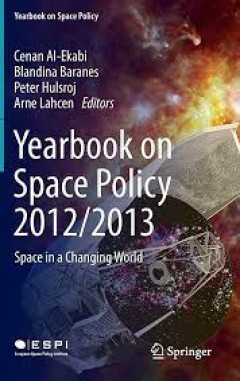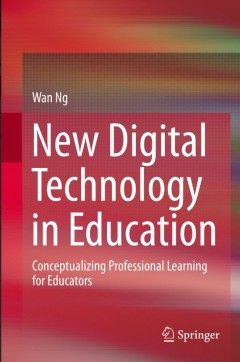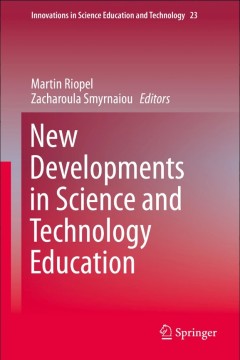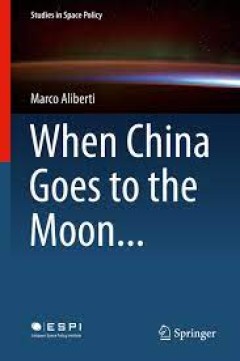Filter by

Yearbook on Space Policy 2012/2013 Space in a Changing Worl
The Yearbook on Space Policy is the reference publication analyzing space policy developments. Each year it presents issues and trends in space policy and the space sector as a whole. Its scope is global and its perspective is European. The Yearbook also links space policy with other policy areas. It highlights specific events and issues, and provides useful insights, data and information on sp…
- Edition
- -
- ISBN/ISSN
- 978-3-7091-1827-6
- Collation
- -
- Series Title
- -
- Call Number
- -

Women's Voices in the Field of Educational Technology Our Journeys
In a professional world that has a tradition of the “good old boy” network, women long have fought for recognition in the educational technology field. In this book authors discuss the women in their own lives who have made the difference for them in their professional development. A group of 31 individuals from the USA, Canada, Northern Cyprus, the UK, and South Korea were asked to be part…
- Edition
- -
- ISBN/ISSN
- 978-3-319-33452-3
- Collation
- -
- Series Title
- -
- Call Number
- -

Wireless World in 2050 and Beyond: A Window into the Future
This book gathers visionary ideas from leading academics and scientists to predict the future of wireless communication and enabling technologies in 2050 and beyond. The content combines a wealth of illustrations, tables, business models, and novel approaches to the evolution of wireless communication. The book also provides glimpses into the future of emerging technologies, end-to-end syste…
- Edition
- -
- ISBN/ISSN
- 978-3-319-42141-4
- Collation
- XXII, 168
- Series Title
- -
- Call Number
- -

Wireless Sensor and Mobile Ad-Hoc Networks Vehicular and Space Applications
Wireless sensor Networks: Vehicle and Space Applications describes the practical perspectives in using wireless sensor networks (WSN) to develop real world applications that can be used for space exploration. These applications include sensor interfaces, remote wireless vehicles, space crew health monitoring and instrumentation. The material discusses how applications of WSN originally develope…
- Edition
- -
- ISBN/ISSN
- 978-1-4939-2468-4
- Collation
- X, 248
- Series Title
- -
- Call Number
- -

Wildland Fuel Fundamentals and Applications
A new era in wildland fuel sciences is now evolving in such a way that fire scientists and managers need a comprehensive understanding of fuels ecology and science to fully understand fire effects and behavior on diverse ecosystem and landscape characteristics. This is a reference book on wildland fuel science; a book that describes fuels and their application in land management. There has nev…
- Edition
- -
- ISBN/ISSN
- 978-3-319-09015-3
- Collation
- XI, 191
- Series Title
- -
- Call Number
- -

New Digital Technology in Education:Conceptualizing Professional Learning for…
This book addresses the issues confronting educators in the integration of digital technologies into their teaching and their students’ learning. Such issues include a skepticism of the added value of technology to educational learning outcomes, the perception of the requirement to keep up with the fast pace of technological innovation, a lack of knowledge of affordable educational digital to…
- Edition
- 1
- ISBN/ISSN
- 978-3-319-05821-4
- Collation
- XXI, 226
- Series Title
- -
- Call Number
- -

New Developments in Science and Technology Education
This book explores the beneficial impact of pedagogically updated practices and approaches in the teaching of science concepts as well as elaborates on future challenges and emerging issues that address Science and Technology Education. By pointing out new research directions it informs educational practices and bridges the gap between research and practice providing information, ideas and new …
- Edition
- 1
- ISBN/ISSN
- 978-3-319-22932-4
- Collation
- IX, 203
- Series Title
- Innovations in Science Education and Technology
- Call Number
- -

Why Cryptography Should Not Rely on Physical Attack Complexity
This book presents two practical physical attacks. It shows how attackers can reveal the secret key of symmetric as well as asymmetric cryptographic algorithms based on these attacks, and presents countermeasures on the software and the hardware level that can help to prevent them in the future. Though their theory has been known for several years now, since neither attack has yet been successf…
- Edition
- -
- ISBN/ISSN
- 978-981-287-787-1
- Collation
- XXI, 122
- Series Title
- -
- Call Number
- -

Handbook of Ocean Wave Energy
This book is open access under a CC BY-NC 2.5 license. This book offers a concise, practice-oriented reference-guide to the field of ocean wave energy. The ten chapters highlight the key rules of thumb, address all the main technical engineering aspects and describe in detail all the key aspects to be considered in the techno-economic assessment of wave energy converters. Written in an easy-to-…
- Edition
- -
- ISBN/ISSN
- 9783319398884
- Collation
- XXI, 287 halaman
- Series Title
- Ocean Engineering & Oceanography
- Call Number
- 551 HAN

When China Goes to the Moon...
This book is about China’s ambitions in its most complex and internationally visible space endeavor, namely its human space exploration programme. It provides a comprehensive reflection on China´s strategic direction and objectives in space, including in particular those set forth in its human spaceflight programme and analyses the key domestic and external factors affecting the country’s …
- Edition
- -
- ISBN/ISSN
- 978-3-319-19473-8
- Collation
- XVI, 336
- Series Title
- -
- Call Number
- -
 Computer Science, Information & General Works
Computer Science, Information & General Works  Philosophy & Psychology
Philosophy & Psychology  Religion
Religion  Social Sciences
Social Sciences  Language
Language  Pure Science
Pure Science  Applied Sciences
Applied Sciences  Art & Recreation
Art & Recreation  Literature
Literature  History & Geography
History & Geography